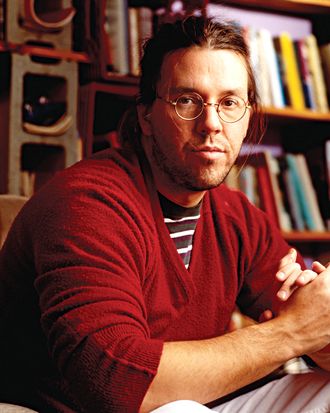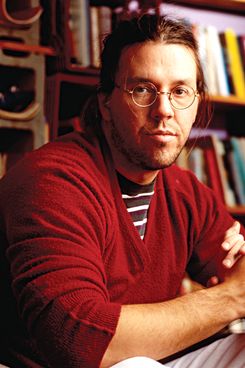

David Foster Wallace’s posthumous novel The Pale King is officially scheduled for release on April 15, but the reviews are already here, if you can even call them just reviews. Considerations of The Pale King are doing far more than weighing in on the new novel — they’re taking a bigger view of Foster Wallace’s work, his major themes, his life, his suicide. Perhaps called to action by Foster Wallace’s work, the writers of these essays are expressing their opinions in far more vigorous prose than your standard book review. So, if you’re looking for some passionate writing about David Foster Wallace, you should read these pieces in their entirety — but if you’re looking for the Cliff’s Notes version, here you go.
Some significantly shortened verdicts on The Pale King. The four-word takeaway: You should read it!
“The Pale King is, for great swaths, an astonishment, unfinished not in the way of splintery furniture but in the way of Kafka’s Castle or the Cathedral of St. John the Divine … What’s remarkable about The Pale King is its congruity with Wallace’s earlier ambitions … The Pale King treats its central subject — boredom itself — not as a texture (as in Fernando Pessoa), or a symptom (as in Thomas Mann), or an attitude (as in Bret Easton Ellis), but as the leading edge of truths we’re desperate to avoid. It is the mirror beneath entertainment’s smiley mask, and The Pale King aims to do for it what Moby-Dick did for the whale … Watching[Foster Wallace] loosed one last time upon the fields of language, we’re apt to feel the way he felt at the end of his celebrated essay on Federer at Wimbledon: called to attention, called out of ourselves. Jesus, just look at him out there.” —Garth Risk Hallberg, New York Magazine
“But the book itself: we still have to talk about the book itself. The Pale King is, for an unfinished book, surprisingly wonderful and finished-seeming. Big chunks of it are full-on Infinite Jest-level great … The Pale King reads, thematically, like a logical sequel to Infinite Jest. Jest is about entertainment. King is about boredom … In the end, The Pale King is basically impossible to review. Everything you could ever say about it comes trailed by 34,000 asterisks. (My review copy stops in midair, with a section labeled ‘Notes and Asides’ that has yet to be filled in.) Since the book never actually ends, it never quite comes into being as an art object. This is frustrating but also freeing. Reading it is strangely intimate: you adore what’s good and (knowing that it might have been fixed) forgive what’s less good.” — Sam Anderson, New York Times Magazine
“You’d be forgiven for suspecting that a book about random people who work for the government sounds insufferably tedious. The reason it’s not has to do with the word about — it’s the wrong word, the wrong preposition. Wallace doesn’t write about his characters; he hadn’t in a long time. He writes into them. That thing he could do on a tennis court or a cruise ship, or at a porn convention, that made him both an inspiration and a maddening, envy-making presence for the scores like me who learned to do ‘magazine writing’ in his shadow (he was one of those writers who, even when you weren’t sounding like him, made you think about how you weren’t sounding like him) — Wallace liked to do that, in his fiction, with his characters’ interior lives … The Pale King has much in common with Infinite Jest, which also took a set group of people, unified in a circumstantial way—in that earlier case, the residents of an addiction halfway house, or the student body of a tennis academy—then reeled off into their lives, creating in the end a kind of spoked wheel of interconnected stories. But The Pale King is not really reminiscent of Infinite Jest, doesn’t put you in mind of it, that is. To read it is in part to feel how much Wallace had changed as a writer, compressed and deepened himself… Even in its broken state, The Pale King contains what’s sure to be some of the finest fiction of the year. —John Jeremiah Sullivan, GQ
“If The Pale King isn’t a finished work, it is, at the very least, a remarkable document, by no means a stunt or an attempt to cash in on Wallace’s posthumous fame. Despite its shattered state and its unpromising subject matter, or possibly because of them, The Pale King represents Wallace’s finest work as a novelist … Nothing in Wallace’s earlier work suggests we’re missing much. He never had a great feel for the novel’s percussion section, the plot and structure and rhythm. Whereas his ability to render the fine finials and fractals and flourishes of a mind acting upon itself, from moment to moment, using only the blunt, numb instruments of language, has few if any equals in American literature, and this we see him do at full extension … The Pale King is imperfect, but it feels more like the work of a human being than Infinite Jest does.” —Lev Grossman, Time
“The work is frustratingly difficult in places. It’s potholed throughout by narrative false starts and dead ends. Characters appear without introduction and disappear without cause. I often found myself putting the novel down, and I didn’t always want to pick it up again. Then I did. Because The Pale King, an unfinished manuscript that will be published this month by Little, Brown, is one of the saddest and most lovely books I’ve ever read … Let’s state this clearly: You should read The Pale King. You don’t have to read it in a couple days or even a couple months. I’m not sure you even need to read it in any particular order. It’s not that kind of book.” —Benjamin Alsup, Esquire
“Just as this lumpy but often stirring new novel emerges as a kind of bookend to ”Infinite Jest,’ so it demonstrates that being amused to death and bored to death are, in Wallace’s view, flip sides of the same coin … Happiness, Wallace suggests in a Kierkegaardian note at the end of this deeply sad, deeply philosophical book, is the ability to pay attention, to live in the present moment, to find ‘second-by-second joy + gratitude at the gift of being alive’ … By turns breathtakingly brilliant and stupefying dull — funny, maddening and elegiac — The Pale King will be minutely examined by longtime fans for the reflexive light it sheds on Wallace’s oeuvre and his life. But it may also snag the attention of newcomers, giving them a window — albeit a flawed window — into this immensely gifted writer’s vision of the human condition as lived out in the middle of the middle of America, toward the end of the 20th century, by worker bees employed as number crunchers for the federal government, worried that they are going to be replaced by computers. Not surprisingly, a novel about boredom is, more than occasionally, boring. It’s impossible to know whether Wallace, had he finished the book, might have decided to pare away such passages, or whether he truly wanted to test the reader’s tolerance for tedium.” — Michiko Kakutani New York Times




